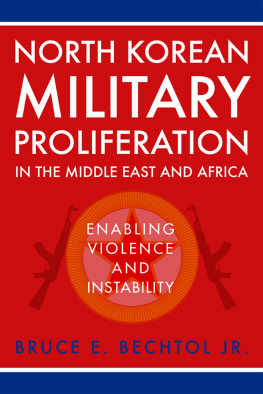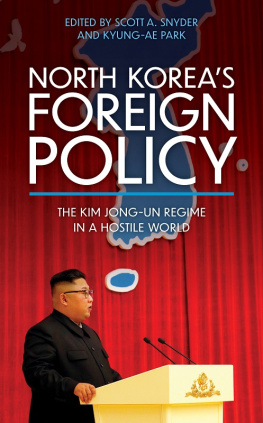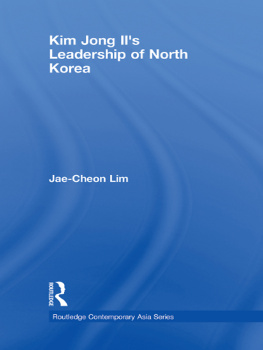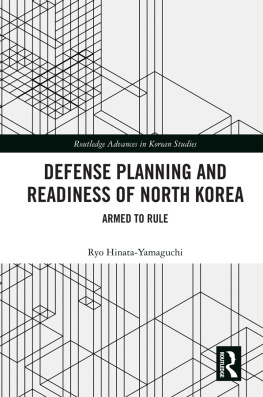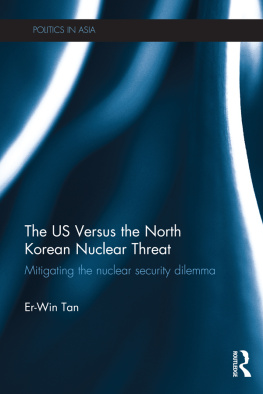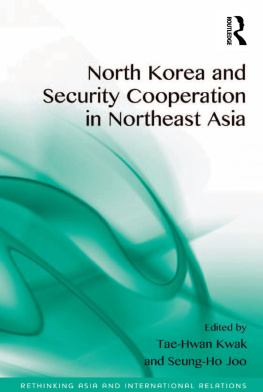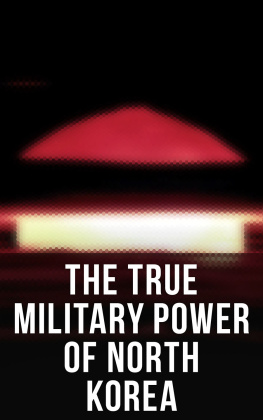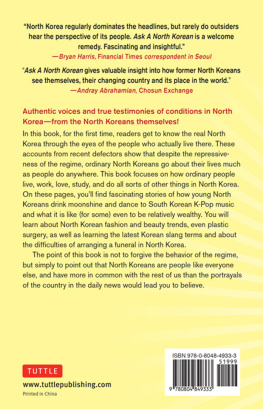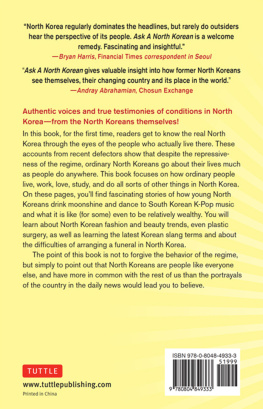
North Korean Military Proliferation in the Middle East and Africa
NORTH KOREAN
MILITARY
PROLIFERATION
IN THE MIDDLE EAST
AND AFRICA
ENABLING VIOLENCE
AND INSTABILITY
BRUCE E. BECHTOL JR.

Due to variations in the technical specifications of different electronic reading devices, some elements of this ebook may not appear as they do in the print edition. Readers are encouraged to experiment with user settings for optimum results.
Copyright 2018 by The University Press of Kentucky
Scholarly publisher for the Commonwealth,
serving Bellarmine University, Berea College, Centre College of Kentucky, Eastern Kentucky University, The Filson Historical Society, Georgetown College, Kentucky Historical Society, Kentucky State University, Morehead State University, Murray State University, Northern Kentucky University, Transylvania University, University of Kentucky, University of Louisville, and Western Kentucky University.
All rights reserved.
Editorial and Sales Offices: The University Press of Kentucky
663 South Limestone Street, Lexington, Kentucky 40508-4008
www.kentuckypress.com
Cataloging-in-Publication data is available from the Library of Congress.
ISBN 978-0-8131-7588-1 (hardcover : alk. paper)
ISBN 978-0-8131-7591-1 (epub)
ISBN 978-0-8131-7590-4 (pdf)
This book is printed on acid-free paper meeting
the requirements of the American National Standard for Permanence in Paper for Printed Library Materials.

Manufactured in the United States of America.
Member of the Association of University Presses
For Sara Beth, a gifted writer, an amazing daughter, and the inspiration for this book.
On Iowa!
Contents
Preface
North Korea has gained a great deal of attention on the world stage since Kim Jong-un became that nations leader in late 2011. The small, isolated nation has detonated a nuclear device (probably a weapon) several times, has tested a wide variety of ballistic missiles, naval systems, and ground systems that could threaten the security of its neighbor to the south (the missiles now have ranges that can threaten most of Asia and probably the United States), and has routinely engaged in rhetoric espousing its intent to use these systems if the leadership in Pyongyang feels threatened by the United States or its allies. But behind all this weapons development is another threatthat of military proliferation.
North Korea is not just a threat to American interests in East Asia because of its advancing weapons systems. In fact, it is not only just a threat to the United States with its advancing ballistic missilesmissiles with ranges that now appear to be able to target the West Coast of America at a minimum. North Korea is in fact an equally menacing threat to American interests and the interests of the international community because of its military proliferation to other volatile and unstable regions worldwide. It conducts military proliferation to regions and countries where these weapons systems, which range from typical conventional small arms all the way up to ballistic missiles and nuclear weapons technology, are most neededin other words, regions that are rife with violence and regions where nation-states and nonstate actors are in need of a variety of weapons systems because of the conflict they are engaged in or have the potential to be engaged in. For better or worse, this has been (for many years) a perfect opportunity for North Korea. The nations it proliferates to are often rogue states themselves (such as Iran, Syria, or Sudan), but there are also other nations in need (or perceived need) of North Koreas systems that have excellent economic and political relations with America and the international community (such as Ethiopia or Egypt). The North Koreans sell to anyone who will pay.
The reason that we should always consider weapons development to be as much of a threat to American interests because of proliferation as what North Korea will do with them militarily in its own region or against the United States (via ballistic missiles) is because of whom these systems go to and because of the regions in which they sit. Thus, I specifically address North Korean military proliferation to the Middle East and Africa. In the Middle East, it is a foregone conclusion that Iran wants to threaten Israel. But Iran also has shown a goal of being the hegemon in the Middle East. This threatens Washingtons Arab allies in the region. We have seen this in Tehrans support for Syria in its civil war as well as the support that Iran has provided to nonstate actors such as Hezbollah, Hamas, and the Houthis. In Africa, there are many nations struggling to attain political and economic stability. But, especially since the end of the Cold War, this has been hampered by instability and violence that show no signs of ending. The United States has interests and allies in both these regions. It is because of the importance of American interests in the Middle East and Africa that I have chosen these two regions for an examination and analysis of their involvement with North Korean military proliferation.
I will address several key issues in this book regarding North Koreas military capabilities, how they are tied in to Pyongyangs proliferation goals, and how this proliferation serves to support the regime while promoting instability elsewhere. Since arriving on the scene as leader following his fathers death, Kim Jong-un has promoted an uptick in military weapons development. Of that there can be no doubt. The data support such an assessment. But why is this important for military proliferation? What role has North Korea played in the Syrian civil war? How has North Korea supported Irans nuclear program? Is the evidence strong enough to reasonably come up with an assessment that this support exists? And what of North Koreas support to the Iranian ballistic missile program? A final question that one would ask regarding the Middle East is, How does North Korea support nonstate actors (terrorists) in the Middle East such as Hezbollah and Hamas? And, of course, since this book will address military proliferation to Africa in detail, the question is, Just how extensive is this? I will answer all these questions in this book. In fact, once the reader has finished it, he or she will be able to make assessments and gain perspective regarding North Koreas military proliferation to key regions and, hopefully, gain insight into the kind of policy that Washington and the international community must embrace in order to contain it.
I wrote this book for what will hopefully be a diverse audience. Individuals who will find it useful will be those who specialize in international security issues, regional specialists (for East Asia, the Middle East, and Africa), scholars of Korea (North and South), military planners, counterproliferation specialists, and anyone who has an interest in the North Korean threat and how it affects American interests abroad. This work and the assessments that it leaves the reader will be of interest to specialists and broader-range analysts alike in the United States, the Middle East, Africa, and East Asia. My goal in writing this book was not only to offer an accurate picture of the current DPRK threat but also to present predictive analysis that will be useful for policy in the future. Thus, this book will hopefully be useful for not only those who have an operational or scholarly interest in these issues but also those who have a practical interest in seeing these challenges resolved.
Next page
